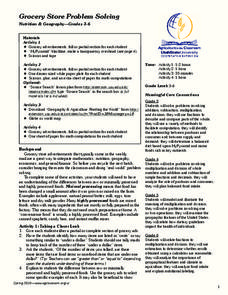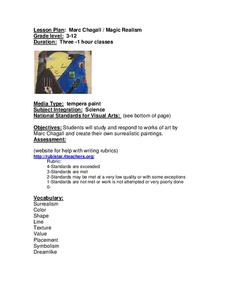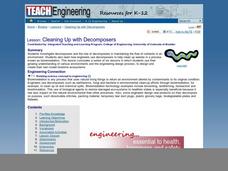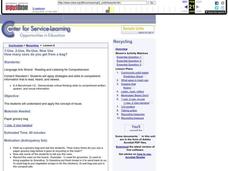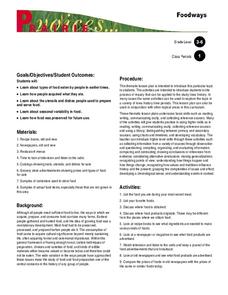Curated OER
Grocery Store Problem Solving
Students use multiple math skills to complete grocery story problems. In this grocery math lesson, students study grocery ads to learn about the cost of foods. Students investigate food types and the costs of processed versus raw foods....
Curated OER
Farming: It's a Fact
What does it take to work in agribusiness? Conduct and explorative investigation which describes where our food dollars go, who makes money on what we buy, and jobs related to agriculture. The class plays an interactive game, analyzes a...
Lunch Lab
Exercise
This is the perfect resource for helping youngsters understand the importance of physical activity in their daily lives. The lesson and its worksheets focus on brainstorming a variety of fitness activities, such as games you can...
Curated OER
Slash Trash! Reducing, Reusing and Recycling Our Way to Zero Waste
The other "Three Rs" are covered in this lesson: reduce, reuse, and recycle. Over four weeks, conservationists collect data about waste in their own homes. They combine their findings with those of other students in order to analyze...
Curated OER
Wants and Needs
Here is an outstanding lesson on wants versus needs designed for 1st graders. Pupils listen to the book, Something Good which presents themes on wants, needs, choice, resources, and counting money. Pupils complete worksheets embedded in...
Council for Economic Education
Sand Art Brownies
Which is better, Coke or Pepsi? Pupils analyze the concept of substitute goods as they investigate the choice to purchase alternate products for better prices. Fun and practical, the engaging shopping exercise helps savvy scholars get...
Curated OER
Thanksgiving Feast
Use the Tool Factory Workshop to have your class create a list of people to invite to their Thanksgiving Feast.They will take pictures related to the fall season and create invitations using Tool Factory Database. Learners make a grocery...
Duluth-Superior Area Educational Television Corporation
Marc Chagall / Magic Realism
Surrealistic painters like Marc Chagall and Wendy Rouse show viewers an expansive world in a small area. Young artists have a opportunity to create their own surrealistic paintings in response to a study of works by Chagall and Rouse.
Curated OER
Cleaning Up With Decomposers
Pupils read and discuss decomposers and how they affect the environment. In this decomposers lesson plan, students also discuss how engineers use decomposers to help the environment.
Curated OER
Learning From the Past
Coming up on the Olympics? Be sure your middle schoolers understand the dynamic and ancient history of this global tradition. They begin by recalling traditions parents have passed down, considering their relevance and ways they might be...
Food a Fact of Life
Top Toastie
Croque-monsieur? How about pizza toast? Fire up the grill and show your young chefs how to prepare and enjoy these tasty offerings. The 13-page packet includes a rationale for the instructional activity, grocery and...
Curated OER
Land Use
Students brainstorm lists of land uses, gather pictures of them, and create a collage. They research land uses in their communities by contacting local agencies. They make charts of the land use planning systems and their impact on...
Curated OER
Stopping Decay
Students review reasons why teeth are necessary, define tooth decay, discuss and list ways to prevent tooth decay, name at least two foods that promote dental health, watch video Tooth Wisdom, and complete worksheet Tooth Healthy Snacks.
Curated OER
Reduce, Reuse, Recycle
Fourth graders discover the differences between: reduce, reuse, and recycle by performing hands on examinations. They list what would happen to the soil if we allowed the earth to wash away and briefly discuss the meaning of erosion.
Food a Fact of Life
Soup-er!
Is there anything better than hot soup on a cold day? Kids prepare either vegetable chowder or minestrone soup in an activity that features the use of the stove top.
Curated OER
Farmers and the Food Connection
Students investigate the process of growing food. In this agricultural lesson, students invite a farmer into their classroom to discuss how they grow and process food. Students participate in learning centers which focus on farming.
Curated OER
The Earth's Surface
Students identify the characteristics of places. In this communities lesson, students discuss what they observe when they travel and construct a list of places in their neighborhood. Students use a Landscape Picture Map to circle...
Curated OER
Stretching Your Money with Coupons
Students examine ways to extend their budget with coupons. For this budgeting lesson, students read information about using coupons at the given website. Students make a list of 30-50 products they use in their homes and use online...
Curated OER
Introduce Vocabulary: Lilly’s Purple Plastic Purse
Students discover the meaning of tier two vocabulary words. In this vocabulary lesson, students read Lily's Plastic Purple Purse, listening for 3 pre-selected, tier two vocabulary words. Words are defined by the teacher and students...
Curated OER
Author's Purpose
How do you determine an author’s purpose? You ask the author, of course. Invite a local journalist into the class to respond to scripted student questions about his/her writing process. A review of basic classroom etiquette is also...
Curated OER
1-Use, 2-Use, Re-Use, New Use
Learners list the possible uses of grocery bags. They trace the steps of a grocery bag either to recycle or trash. In groups, students use the grocery bags to create posters promoting reuse.
Curated OER
Social Studies: Cameroon
Students discover the history of Cameroon and compile a list of foreign foods found in their local grocery. After taking notes on a lecture, they brainstorm a list of foods they might find on a trip to the country and compare it to what...
Curated OER
Adding Punctuation
Students explore using correct punctuation in their sentences. they discuss the various punctuation rules. Students practice putting the correct punctuation in a list of sentences.
Curated OER
Foodways
Fourth graders discuss where food is obtained and list their favorite items. They research recipes to discover their ingredients. They investigate the advertising and cost of food and prepare menus from earlier eras.
